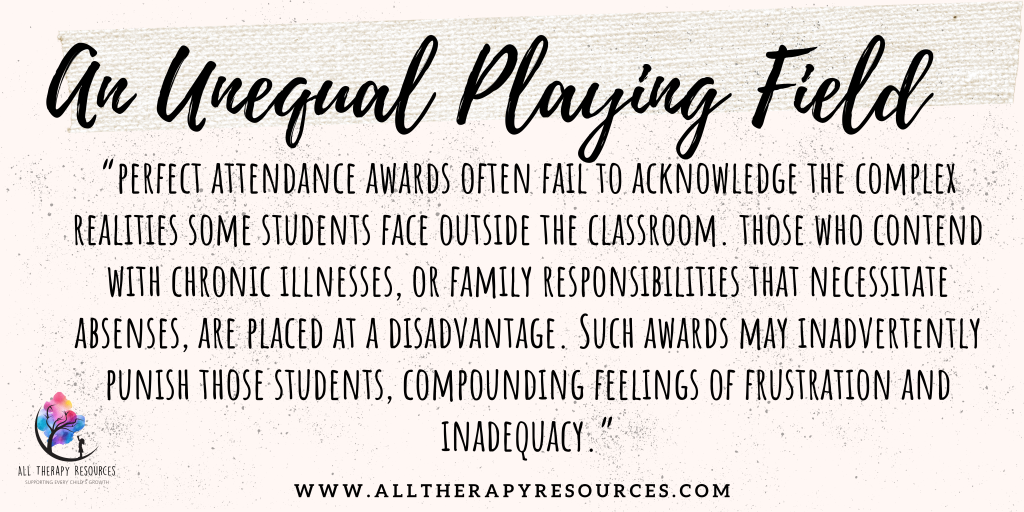
In our pursuit of academic excellence, schools have long celebrated perfect attendance. It’s been a badge of honor for students, a proud moment for parents, and a metric of success for educators. But is it time to question this tradition? As an experienced school counselor, behavior practitioner and play therapist, I’ve witnessed firsthand the complex implications of such awards. This post delves into why the perfect attendance award may need a rethink, prioritizing our students’ health and holistic development over their uninterrupted presence in the classroom.
The Paradox of Perfect Attendance Awards
A Closer Look at Health Risks
In the realm of education, perfect attendance awards have long been hailed as a testament to a student’s dedication and commitment. Yet, this seemingly positive reinforcement harbors an underlying issue: it may inadvertently downplay the importance of health. When children attend school while ill, they not only hinder their own recovery but also increase the risk of contagion, turning schools into hotbeds of potential infection. It’s crucial to examine the subtle implications of such awards; they can send a message that physical presence is valued over the wellbeing of the individual and the community. Let’s delve into the nuanced conversation about why prioritizing attendance over health could be counterproductive to the very ethos of education and communal welfare.
A Missed Lesson in Health Prioritization
The pursuit of a perfect attendance record often results in students attending school despite illnesses, essentially teaching them to ignore their body’s signals. This can establish a pattern of neglecting personal health which might carry into adulthood, influencing their future decisions about work and well-being. As educators and counselors, our role extends beyond academics; it’s about imparting life lessons that value health as the cornerstone of success. By realigning our policies and recognition systems, we can promote an understanding that health directly impacts academic performance and is not a separate entity. Emphasizing the importance of health prioritization prepares our students not only for academic success but also for a balanced and responsible life.

The Psychological Impact on Students
The Stress of Perfection
The relentless pursuit of perfect attendance can exert an immense psychological burden on students. They might grapple with the fear of missing school, which could escalate into a chronic state of worry, overshadowing their educational experience. This constant concern about attendance can undermine their focus on learning and diminish their enjoyment of school. We must question the wisdom of setting such expectations that potentially breed a culture of anxiety. It’s imperative that we shift our focus towards fostering a supportive environment where students feel valued for their efforts, not just their attendance. Let’s explore strategies to mitigate this stress and bolster our students’ mental health, creating a school atmosphere that prioritizes well-being as much as academic achievement.
An Unequal Playing Field
Furthermore, perfect attendance awards often fail to acknowledge the complex realities some students face outside the classroom. Those who contend with chronic illnesses, or family responsibilities that necessitate absences, are placed at an inherent disadvantage. Such awards may inadvertently punish these students, compounding feelings of frustration and inadequacy. This practice can create an environment where students feel alienated or penalized for circumstances beyond their control, fostering resentment and diminishing self-esteem. It’s essential for schools to practice empathy and create recognition systems that account for these disparities, ensuring every student feels supported and has an equal opportunity to be celebrated for their unique contributions to the school community.

Creating a Fair and Supportive Environment
Inclusivity Over Awards
The drive towards inclusivity in schools is not just a trend but a necessity. When we transition away from awards that commend perfect attendance, we pave the way for a more compassionate environment that honors a range of student achievements. It’s about acknowledging that each student brings something unique to the table, whether it’s academic prowess, artistic talent, or the courage to overcome personal challenges. Celebrating collective achievements can lead to a richer, more diverse educational experience for all. Such an environment nurtures a sense of belonging and community, which, in turn, bolsters a student’s connection to their school. Let’s craft award systems that reflect our commitment to every student’s worth and potential, regardless of the number of days they’ve attended school.
Supportive Policies for Absenteeism
The rigid structures of traditional attendance policies can sometimes do more harm than good. Modern education demands policies that acknowledge the multifaceted lives of our students. Instead of penalizing absences, schools can adopt a more supportive approach that considers valid reasons for not attending school. This could include accommodations for students with chronic illnesses, flexible deadlines for those dealing with family emergencies, and catch-up sessions for students who miss classes. Such policies convey to students that their education is a journey with the school as their ally, not a hurdle to be cleared at the expense of their well-being. Let’s discuss and develop school policies that support and validate the diverse needs of our student population, ensuring that every child knows their educational journey is respected and valued.
Building Autonomy and Responsible Decision-Making
Teaching Health Autonomy
Autonomy in health decision-making is a critical life skill. As school counselors, we have the unique opportunity to guide students in recognizing when they need to prioritize their well-being over school attendance. This education goes beyond the classroom—it’s about empowering students to discern when they need rest and recuperation, thereby taking charge of their health. Through this approach, we instill in them the ability to make choices that are in their best interest, laying the groundwork for self-care that extends into adulthood. Nurturing this autonomy supports the development of responsible individuals who can balance their academic aspirations with the necessity of maintaining their physical and mental health.
Encouraging Quality Over Quantity
In the educational landscape, the emphasis often lies on metrics and statistics, with perfect attendance being one such measure. However, we must pivot towards valuing the quality of students’ school experiences. This means prioritizing their active participation, engagement, and the substance of their learning over simply being present. By cultivating an environment where depth of knowledge and critical thinking are celebrated, we send a clear message: what students learn and how they apply it is far more significant than how often they sit in a classroom. This qualitative focus not only enriches the educational experience but also prepares students for the complexities of real-world problem-solving and lifelong learning.

Alternatives to Perfect Attendance Rewards
Recognizing Improvement and Effort
The true spirit of education is not just about attendance but about personal growth and learning. Schools can lead the way in adopting alternative forms of recognition that celebrate students for their perseverance, improvement, and dedication. Whether it’s an upward trend in grades, enhanced participation in class discussions, or a display of leadership in group projects, these milestones deserve to be recognized. Schools could implement programs that highlight consistent improvement or the mastering of new concepts, rewarding the journey rather than the mere act of showing up. Such practices can inspire all students to strive for personal bests, knowing that their efforts will be noticed and celebrated, fostering a motivational climate that extends beyond the classroom.
Promoting a Well-Rounded Approach to Education
A well-rounded education transcends academic metrics; it is about nurturing the whole child—intellectually, emotionally, and socially. This approach advocates for the development of a broad range of skills and the recognition of varied achievements, from creative endeavors to community service. Emphasizing personal development areas such as teamwork, empathy, and critical thinking equips students for the multifaceted challenges of life. By embracing a broader educational vision, schools can cultivate adaptable, resilient individuals who not only excel academically but also contribute positively to society. This holistic emphasis ensures that students are not just well-educated but also well-prepared for the complexities and demands of the wider world.
Conclusion: A Call for Change in School Culture
As we reflect on the implications of perfect attendance awards, it becomes clear that a shift is needed—a shift that values health, encourages resilience, and celebrates a variety of student achievements. As school counselors, we are in a unique position to lead this change, advocating for policies that support our students’ diverse needs.
Call to Action: Advocating for Healthier School Policies
Let us work together to create educational environments that value and support every aspect of our students’ development. Join me in reimagining a school culture that promotes not just academic success, but also the health and well-being of our student communities.








